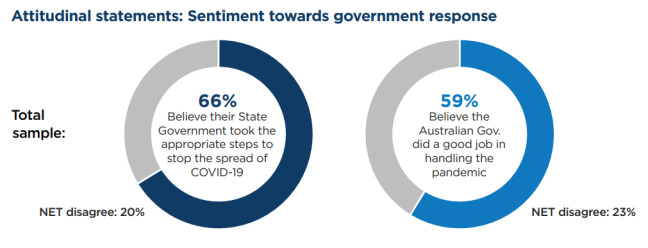While the Australian government’s response to the Covid-19 pandemic helped save lives, human rights were not always considered or protected, says a report.
Published by the Australian Human Rights Commission, the document – Collateral damage – explores the human rights impacts of Australia’s Covid response through the testimonies of more than 5,000 Australians.

“During the pandemic, Australians had to live with significant restrictions on our human rights,” says Human Rights Commissioner Lorraine Finlay. “Measures such as international and interstate border closures, hotel quarantine, lockdowns, school closures, restrictions in aged care homes, vaccine mandates and mask mandates had a substantial – and often hidden – human cost.”
Covid-19 was declared a human biosecurity emergency in Australia in March 2020; the emergency classification remained in effect until April 2022.
Many of the respondents and communities the commission engaged with when compiling the report said blanket and inflexible policies to deal with the emergency failed to reflect local realities.

While most people complied with the health guidelines out of communal responsibility – three in five people surveyed agreed the Australian government did a good job in handling the pandemic and their state/territory took appropriate steps – inconsistent communication and perceived inequalities eroded trust in government decisions.
“During the first weeks and months of the pandemic, it quickly emerged that measures that were put in place to protect public health were having disproportionate impacts on certain groups of people,” says the report.
Among the disproportionate impacts highlighted:
- relatives unable to visit dying family members or return home in a time of need
- abrupt and inconsistent border closures disrupting access to healthcare, education, and employment
- barriers faced by First Nations communities, migrant communities and people with disability in accessing essential information and services.
The Victorian government led by Daniel Andrews is singled out in the report for the 2021 Melbourne tower lockdowns, which the commission deems “a severe response that violated Victorian human rights laws”.
Measures were having disproportionate impacts on people
There existed a tale of two pandemics, says the report. While those in secure jobs able to work remotely largely thrived, “casual workers, renters, and at-risk groups such as non-residents, First Nations peoples, and victim-survivors of domestic violence bore the brunt of the pandemic’s impacts”.
Aged care residents also felt the brunt of the Covid response, says the report. Lockdowns and prolonged visitation restrictions “caused loneliness and distress, particularly during end-of-life care”.
Students, too, were negatively impacted. “Remote learning exacerbated inequities, with disadvantaged students falling further behind due to limited access to technology and stable learning environments,” says the report.
The 155-page report details key recommendations addressing themes such as human rights, communication, and local knowledge.
- consider and embed human rights in emergency response decision making from the outset
- meaningfully consult with the people actually impacted around what is needed at a practical level to ensure emergency response measures meet their needs
- provide support for at-risk groups to be able to self-advocate for their needs, especially those who have barriers accessing systems
- ensure that emergency response measures are only in place for the shortest necessary period of time
- exemption mechanisms that are clear, fair and accessible must be integrated into all emergency response policies
- ensure accurate and consistent information is delivered through trusted sources recognising that this may require different approaches in different communities
- empower local communities – including through local government, service providers and organisations – in emergency response measure development, localisation and implementation.
The AHRC report calls on all tiers of government to learn the lessons from the pandemic so that future responses to emergencies can be improved.
“The overall aim is to develop a human rights emergency response framework that puts rights and freedoms at the heart of how we respond to all future emergencies and disasters in Australia,” said Finlay. “We want to ensure that no one is left behind when the next crisis comes.”




Leave a Reply